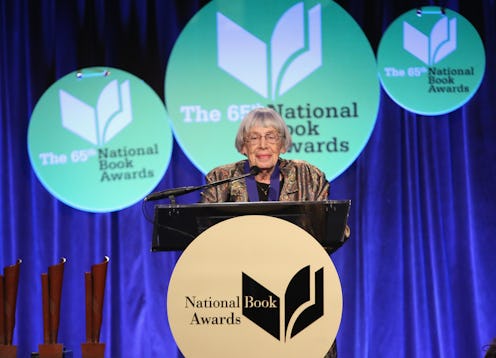
On Monday, the groundbreaking science fiction and fantasy author Ursula K. Le Guin died at her Portland, Oregon, home at the age of 88. She was lauded as a vivid storyteller who injected feminism into a genre traditionally dominated by men. With her recent passing, it's likely that her books are about to fly off the shelves, and if you haven't had the chance to pick up any of her novels, essays, or poetry, now is definitely the time. And while it's not possible to definitively determine what Le Guin's best book is, there's definitely one major contender: The Left Hand Of Darkness.
Winner of the Hugo and Nebula awards for Best Science Fiction of the Year, this 1969 novel was an instant success, launching Le Guin into the literary spotlight. One of the major topics in the book is androgyny; the story takes place on a planet named Gethen, whose inhabitants do not have a fixed gender or sex.
The protagonist of the novel, meanwhile, is masculine envoy Genly Ai, who is sent to Gethen to convince those that live there to join a confederation of planets known as the Ekumen. But, when Ai arrives, he has difficulty understanding and relating to Gethen's culture, which is vastly different from where he comes from, the planet Terra.
But while Ai has difficulty connecting with the inhabitants of Gethen, the feeling, for some, is mutual. Made to be the outsider — the only permanently gendered figure in a world of ambisexuals —many natives regard him as being perverted. These sociological upsets are some of the key themes that critics found favor in when Darkness was first released — in a genre that so frequently relies on hyper-masculine displays of strength, Le Guin removed the concept of gender and gender norms entirely. "I eliminated gender to find out what was left," she reportedly told The Guardian.
In this way, The Left Hand of Darkness is emblematic of Le Guinn's legacy — one whose history challenges conventions and replaces them with its own. She argued that traditional science fiction writers focused to hard on the so-called "hard" sciences, like physics and chemistry. In a 2013 interview with The Paris Review, she said that when she creates fictional worlds, she focuses on more than hard governance or "empires" :
The 'hard'–science fiction writers dismiss everything except, well, physics, astronomy, and maybe chemistry. Biology, sociology, anthropology—that’s not science to them, that’s soft stuff. They’re not that interested in what human beings do, really. But I am. I draw on the social sciences a great deal.
Le Guin, born in 1929, grew up in a household full of people who studied societal structures — both of her parents were anthropologists. And in fact, even in the context of her own career, she challenged conventions. She didn't want to be referred to as a science fiction writer, for example, telling writer Julie Philips in 2012, "I would love to see somebody, somewhere, sometime, just talk about me as an American novelist."
While she never quite achieved that goal, she did continue to write and accrue awards through out her life — for example, being awarded the National Book Foundation Medal for Distinguished Contribution to American Letters in 2014. In her acceptance speech, she urged publishers not to prioritize sales and profits over quality writing and art production.
"Books aren’t just commodities; the profit motive is often in conflict with the aims of art," she said. "We live in capitalism, its power seems inescapable — but then, so did the divine right of kings. Any human power can be resisted and changed by human beings. "